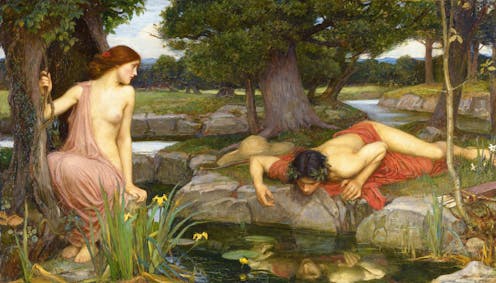
How Ancient Myths Illuminate Modern Narcissism and Echoism
July 9th, 2024
00:00

00:00
Summary
- Explores the myth of Narcissus and Echo, linking to modern psychological phenomena
- Examines the dangers of excessive self-love and the pain of self-negation
- Discusses the malleability of narcissism and echoism in contemporary society
- Highlights the importance of balancing self-love for psychological well-being
Sources
In the vast expanse of human emotions and relationships, ancient Greek mythology serves as a rich source of psychological insight, offering narratives that continue to resonate deeply with contemporary society. Among these narratives, the myth of Narcissus and Echo stands as a poignant reflection of the complex interplay between self-love and the need for recognition from others. The story begins with Narcissus, a youth of unparalleled beauty, who becomes the object of desire for many, yet remains indifferent to their affections. His fate takes a tragic turn when he catches a glimpse of his own reflection in a pool of water and falls hopelessly in love with it, not realizing it is merely an image. Unable to tear himself away, Narcissus ultimately withers away by the waters edge, consumed by his unattainable love. Echo, on the other hand, is a nymph cursed by Hera, the queen of the gods, to only repeat the last words spoken to her. Her voice, once her greatest asset, becomes a source of perpetual echo, symbolizing the loss of her own voice and identity. She falls in love with Narcissus, but her inability to initiate conversation or express her feelings leads to her own downfall. As Narcissus rejects her, Echo fades away, leaving behind nothing but her voice. The tragic stories of Narcissus and Echo serve as allegories for narcissism and echoism, respectively. Narcissism, characterized by an excessive preoccupation with oneself and a lack of empathy for others, is mirrored in Narcissuss fixation on his own reflection. Echoism, the lesser-known counterpart, manifests as an excessive focus on others at the expense of ones own needs, symbolized by Echos loss of voice and identity. These myths provide a framework for understanding the dynamics of modern relationships, where interactions often reflect a spectrum of narcissistic and echoic behaviors. The attraction between narcissists, who seek validation without reciprocating, and echoists, who give without expecting anything in return, highlights a complex interdependence that can lead to unhealthy relationships. Furthermore, the narratives prompt a reevaluation of the notion that personality traits are fixed. Instead, they suggest that individuals display a range of behaviors influenced by their environment and interactions with others. Recognizing this fluidity is crucial in fostering healthier relationships and achieving a balance between self-love and empathy towards others. The enduring relevance of these ancient myths underscores the timeless nature of human psychology and the universal quest for understanding oneself and others. Through the lens of Greek mythology, contemporary society can gain insights into the intricacies of human behavior, the dangers of extreme self-obsession or self-negation, and the importance of nurturing a balanced sense of self.